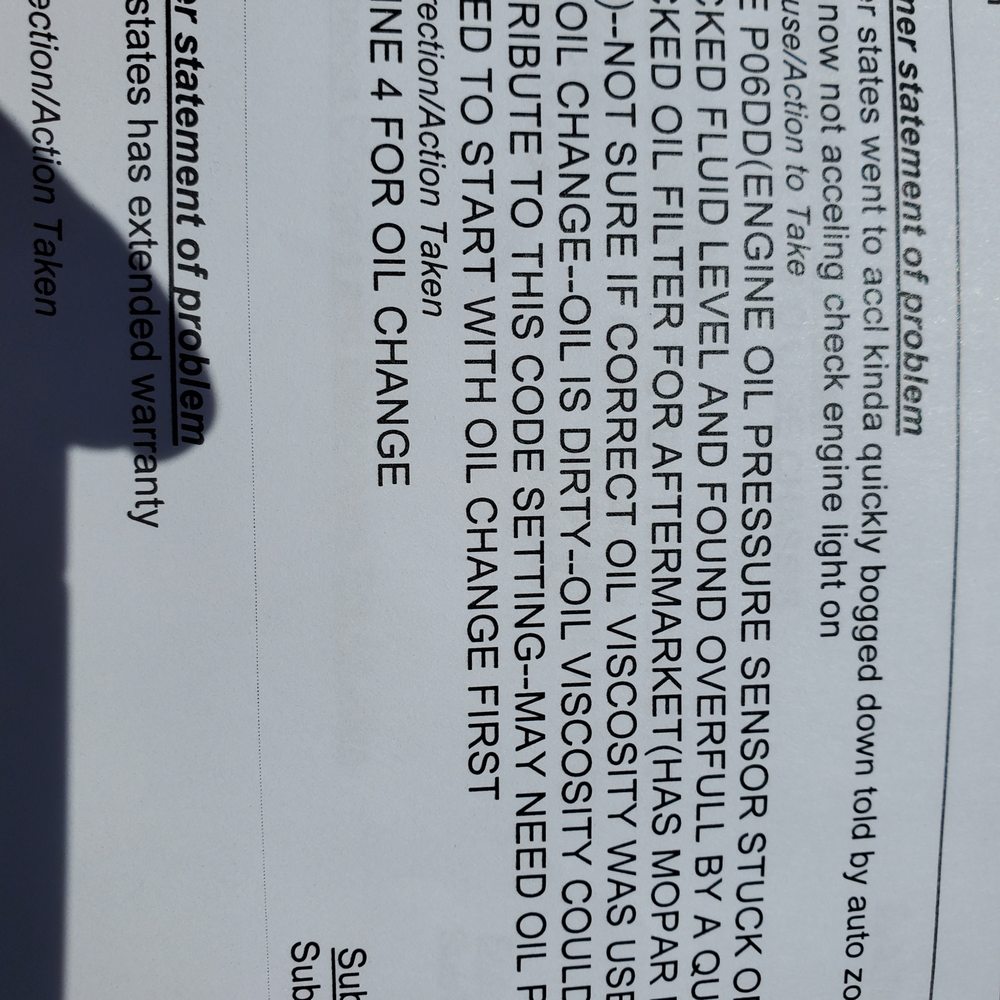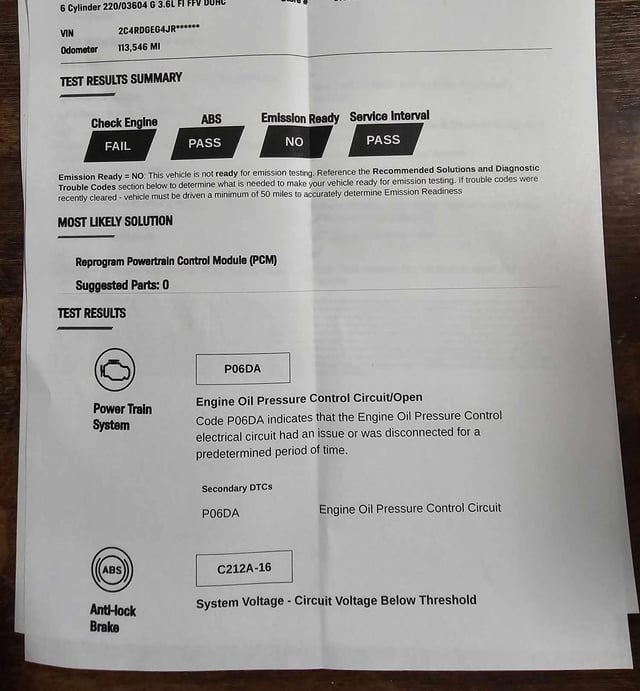The Engine Oil Maintenance Ford Warning indicates low oil pressure, necessitating immediate attention to prevent engine damage. Neglecting this warning can lead to costly engine repairs or even complete engine failure.
It is crucial to address the issue promptly by checking oil levels, oil pump, and sensors. Driving with low oil pressure can have severe consequences, so it is recommended to have the vehicle inspected by professionals as soon as possible.
Regular maintenance and timely oil changes are essential to keep your Ford vehicle running smoothly and prevent potential issues with the engine. Remember to follow manufacturer recommendations for oil change intervals to ensure optimal performance and longevity of your vehicle.
Introduction To Engine Oil Maintenance
The Ford engine oil maintenance warning is crucial for vehicle health. Ignoring the warning can lead to low oil pressure, potentially causing engine failure. It’s essential to address the warning immediately to prevent long-term damage.
The Role Of Engine Oil
Engine oil plays a critical role in ensuring the smooth operation of your vehicle’s engine. It acts as a lubricant, reducing friction between moving parts, which helps to prevent wear and tear. Additionally, engine oil helps to dissipate heat, keeping the engine operating at optimal temperatures. It also aids in maintaining a clean engine by trapping dirt and debris, preventing them from causing damage. Proper engine oil maintenance is essential to ensure the longevity and performance of your vehicle.
Consequences Of Neglect
Neglecting engine oil maintenance can lead to severe consequences for your vehicle. Insufficient or degraded engine oil can result in increased friction and heat, leading to accelerated wear on engine components. This can cause engine parts to seize or fail, resulting in costly repairs or even complete engine replacement. Furthermore, neglecting engine oil maintenance can void vehicle warranties and reduce the overall lifespan of the engine. It’s crucial to address engine oil maintenance promptly to avoid these detrimental consequences.

Credit: www.reddit.com
Recognizing The Warning Signs
Recognizing the warning signs of Engine Oil Maintenance in Ford vehicles is crucial. Ignoring the oil warning light could lead to engine failure due to low oil pressure. It’s essential to address any oil maintenance alerts promptly to prevent costly damage and ensure optimal engine performance.
Recognizing the Warning Signs Proper engine oil maintenance is crucial to the longevity and performance of your Ford vehicle. One way your car alerts you to potential oil issues is through warning messages. It’s important to recognize these signs and take action to avoid costly repairs down the road. In this section, we’ll explore two key aspects of recognizing warning signs: understanding the oil maintenance light and interpreting oil warning messages.Understanding The Oil Maintenance Light
The oil maintenance light is a dashboard indicator that illuminates when your car’s computer system determines that it’s time for an oil change. This light may also be labeled as the “oil change required” light. When this light comes on, it’s important to schedule an oil change as soon as possible to avoid potential engine damage. Ignoring this warning could lead to decreased engine performance or even complete engine failure.Interpreting Oil Warning Messages
In addition to the oil maintenance light, your Ford vehicle may also display other oil warning messages. These messages can vary depending on the specific model and year of your car, but some common ones include “low oil pressure,” “engine oil change soon,” or “engine oil pressure low.” It’s important to take these messages seriously and seek professional assistance to diagnose and fix any potential issues. Some drivers may wonder if it’s safe to drive with the oil maintenance light or other warning messages on. The answer is no – driving with low oil pressure or low oil levels can lead to serious engine damage and potentially costly repairs. Always address any warning signs as soon as possible to keep your car running smoothly. In conclusion, recognizing warning signs related to engine oil maintenance is crucial for the proper functioning of your Ford vehicle. By understanding the oil maintenance light and interpreting oil warning messages, you can take proactive steps to keep your car in top shape. Remember to always address any warning signs promptly and seek professional assistance if needed.Immediate Steps After A Warning
When the engine oil maintenance warning light illuminates on your Ford, it’s crucial to take immediate action to prevent potential damage to your vehicle. Ignoring this warning can lead to severe engine problems and costly repairs. Here are the essential immediate steps to take after receiving an engine oil maintenance warning.
Checking The Oil Level
1. Park your vehicle on a level surface to ensure an accurate oil level check.
2. Turn off the engine and wait for a few minutes to allow the oil to settle in the oil pan.
3. Locate the oil dipstick, pull it out, wipe it clean, reinsert it, and then pull it out again to check the oil level.
When To Stop Driving
1. If the oil level is below the minimum mark on the dipstick, do not drive the vehicle.
2. If the warning light persists after ensuring the oil level is adequate, it’s unsafe to continue driving.
3. Contact a professional technician immediately for a thorough inspection and resolution.
Common Causes For Oil Maintenance Alerts
The Engine Oil Maintenance Ford Warning can be triggered by low oil pressure, sensor issues, or oil pump problems. Ignoring this alert and driving with low oil levels can lead to severe engine damage, necessitating costly repairs or replacement. Immediate professional inspection is crucial to prevent engine failure.
Sensor Issues and Malfunctions Oil Pressure and Pump Concerns Sensor Issues and Malfunctions One common cause for oil maintenance alerts is sensor issues and malfunctions. Faulty sensors can inaccurately detect oil levels or pressure, triggering warning alerts. Oil Pressure and Pump Concerns Another common cause for oil maintenance alerts is related to oil pressure and pump concerns. Low oil pressure or pump malfunctions can lead to insufficient lubrication, causing the system to trigger maintenance alerts. In summary, sensor issues, and malfunctions along with oil pressure and pump concerns are common causes for oil maintenance alerts in vehicles. Regular maintenance checks and prompt action can help prevent serious engine issues.The Importance Of Timely Oil Changes
Recommended Oil Change Intervals
Regular oil changes are crucial for maintaining the health and longevity of your Ford vehicle. Experts recommend changing your engine oil every 5,000 to 7,500 miles or as per the manufacturer’s guidelines.
Intelligent Oil-life Monitor System
Ford vehicles are equipped with an intelligent Oil-Life Monitor System that tracks driving conditions and engine performance to determine the optimal time for an oil change. This system ensures that you change your oil only when necessary, based on real-time data.

Credit: m.youtube.com
Resetting The Oil Maintenance Light
Resetting the oil maintenance light on your Ford vehicle is a simple process that can easily be done at home, saving you time and money. It’s important to reset the oil maintenance light after an oil change to ensure that the system accurately tracks when the next service is due. Here’s a step-by-step guide to help you reset the oil maintenance light on your Ford:
Step-by-step Guide
- Start by turning the ignition to the ON position without starting the engine.
- Press the accelerator pedal to the floor and release it three times within five seconds.
- Wait for the oil maintenance light to flash and then turn off, indicating that the reset is complete.
- Turn off the ignition and then start the engine to ensure that the oil maintenance light has been successfully reset.
When To Consult A Professional
If you encounter any difficulties or are unsure about the reset process, it’s advisable to consult a professional mechanic or refer to your vehicle’s manual for specific instructions. Additionally, if the oil maintenance light continues to illuminate after the reset, it may indicate an underlying issue that requires professional diagnosis and attention.
Long-term Engine Health Strategies
Implementing effective long-term engine health strategies involves prioritizing engine oil maintenance to avoid Ford warning signals. Regularly checking oil levels and promptly addressing any warning lights can prevent costly engine damage and ensure optimal performance for your vehicle in Austin, Texas.
Choosing The Right Oil
One of the most important aspects of long-term engine health is selecting the right oil for your Ford vehicle. Different engines require different types of oil, and it’s important to choose the right one to ensure optimal performance. Consult your owner’s manual or speak with a trusted mechanic to determine the best oil for your engine.Routine Check-ups And Maintenance
Regular oil changes and routine check-ups are essential to maintaining the long-term health of your Ford engine. Check your oil levels regularly and change your oil according to the recommended schedule in your owner’s manual. Neglecting routine maintenance can lead to serious engine problems down the line. Other important routine maintenance tasks include checking your air filter, inspecting your belts and hoses, and monitoring your coolant levels. Stay on top of these tasks to ensure your engine stays healthy for the long haul. In summary, choosing the right oil and staying on top of routine maintenance are key strategies for maintaining the long-term health of your Ford engine. Neglecting these tasks can lead to serious engine problems and costly repairs in the future. Take care of your engine now to avoid problems down the road.Cost Of Ignoring Oil Maintenance
Proper engine oil maintenance is crucial for the longevity and performance of your Ford vehicle. Neglecting oil maintenance can lead to severe consequences, both for your engine’s health and your finances. Let’s delve into the potential engine damage and the financial impact of repairs resulting from ignoring oil maintenance.
Potential Engine Damage
Ignoring regular oil changes and maintenance intervals can result in significant engine damage. Inadequate lubrication due to old or insufficient oil can lead to increased friction and heat within the engine components, causing premature wear and tear. Abrasive particles and sludge accumulation in the old oil can further damage engine parts, impacting the overall performance and reliability of your Ford vehicle.
Financial Impact Of Repairs
The financial repercussions of neglecting engine oil maintenance can be substantial. Repair costs for engine components damaged due to poor lubrication can be exorbitant. Replacing worn-out piston rings, bearings, or even the entire engine can drain your wallet. Additionally, the downtime for extensive repairs can inconvenience your daily routine and lead to additional expenses for alternative transportation.

Credit: mechanics.stackexchange.com
Frequently Asked Questions
What Does Maintenance Engine Oil Mean?
Maintenance engine oil refers to regularly changing and replenishing the oil in a vehicle’s engine to ensure optimal performance.
Can I Drive With Oil Maintenance Light On?
No, driving with the oil maintenance light on is not recommended. Low oil pressure can cause serious engine damage.
What Is The Oil Warning On A Ford?
The oil warning on a Ford indicates low oil pressure, which can damage the engine if ignored. Get it checked immediately.
How Long Can You Drive With Engine Oil Warning?
It is not safe to drive with the engine oil warning light on for an extended period. The light indicates low oil pressure, which can cause serious engine damage. It is best to find a safe place to stop and have your car checked out as soon as possible.
Conclusion
Staying vigilant about engine oil maintenance is crucial for Ford vehicles. Ignoring warning lights can lead to engine damage. Regular oil checks and timely changes are key. Trust certified technicians for oil-related issues to ensure your Ford’s longevity and optimal performance.
Stay informed and proactive!


